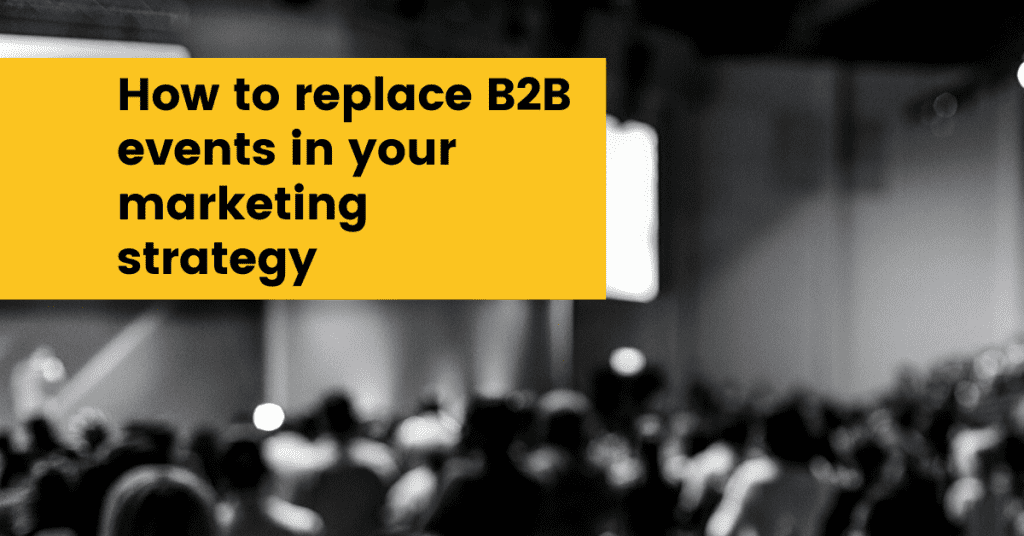The present situation brought a lot of changes to the way we do business and the marketing activity we can run. Even before we started social distancing, a lot of events got cancelled, from the big ones with tens of thousands of attendees such as Mobile Word Congress, to the smaller meetings, gathering 50 to 100 people.
Whether you’re running events of your own or planned to attend the ones of others, they are an important part of the marketing strategy. You may have seen a gazillion articles telling you how to move the events online, so I’m not going to bang that drum anymore, but rather talk about how you can replace events and still aim to reach your marketing strategy.
But before we start discussing channels, consider your messaging. Sure, your clients are online, but ask yourself:
- do they care about your service at the moment?
- does it make their (virtual/remote) work easier?
- if their budgets were severely cut, would they still need or want to invest in your service?
If the answer to any of these questions is no, you might have to reconsider your service before working on channels.
Events for awareness – replace with digital ads
Well, awareness isn’t an objective in itself, because no one (should) care about it unless you can monetise it. But let’s assume that at the moment you were joining the event, you were only planning to gather some immediate awareness, with the goal of converting it to leads later on, which may be the case if, for example, you were beta testing a service you will be launching later.
This means that your goals included a bigger exposure in front of your target market, with whom you’re not in contact with yet. Your clients are now online, so you can go and target them using online tools – social media (organic and ads), Google Ads, partnerships with different communities (such as Meetups or Slack groups from your target audience). I haven’t heard of too many people having success with LinkedIn group promotions lately, but would love to be contradicted if anyone has made it work.
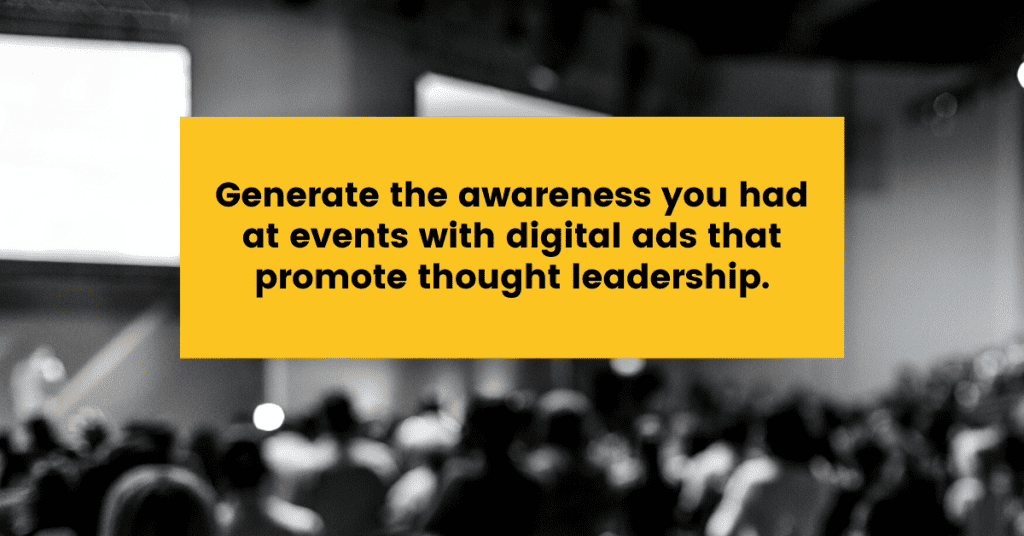
I’d recommend generating awareness with thought leadership rather than with general ads. For example, for a client we work for in lead generation and conversion, Maastricht School of Management School, we combined digital events with ads to generate awareness, on a topic that is relevant for our audience now: leadership in times of crisis.
The response was great, with a 50% increase in reach and 151% increase in Facebook likes. I believe the main reason behind this was the value of the webinar – it talked about issues for businesses and how to overcome them, with 0 sales pitch. We wrote about the results in this LinkedIn post.
Here is some further reading into leveraging existing Slack communities for your marketing efforts.
Events for lead generation – replace with content marketing & chatbots
This is probably the most popular reason why companies attend or run their own events. According to the 2019 Demand Gen Report, 47% of B2B marketers use events to drive demand. This then goes to help the marketing and sales efforts across the year, so not having this channel for lead generation can be very difficult.
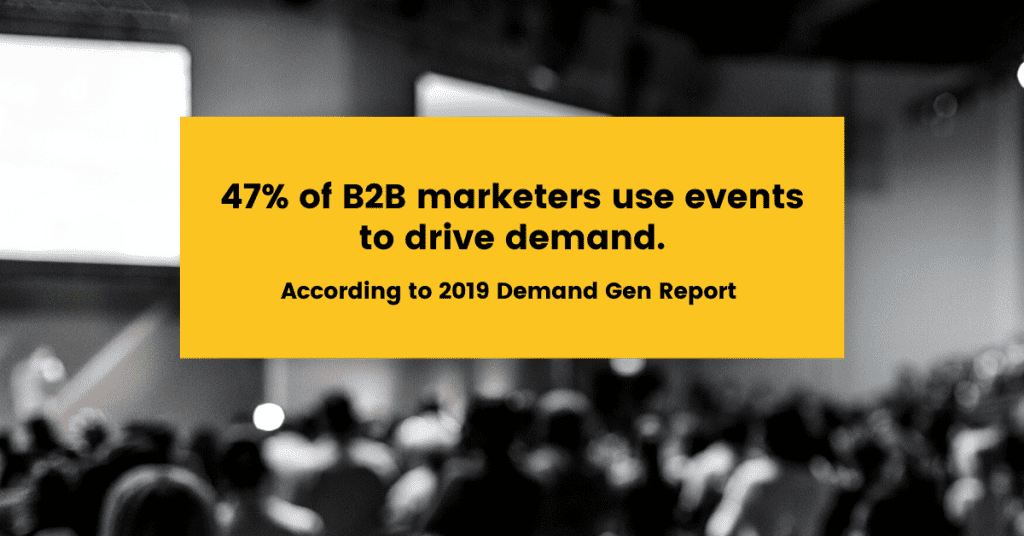
Yes, you have the option to run webinars, virtual fairs, online meetings, but your customers will always miss interactions and that’s not something easily replaceable with digital interaction. Plus, with a lot of events being moved to online, it may lead to a point where your audience is bombarded with too many events and don’t want to engage with them anymore, especially after most of their days being spent on calls nowadays anyway.
Events used to be a way of escaping the office, so if you want to build a digital experience, try to consider how you may offer that. How engaging and fun you can be, so you still deliver that “out of office” experience.
I recommend you replace your offline events with content marketing, tailored to your audience current needs. This may take the form of whitepapers, surveys, Twitter chats, online Q&As, short videos – whatever your creativity comes up with. I would also advise that any content you create take into account the 80-20 rule, with at least 80% of the content being informational and less than 20% being promotional. Your goal is to offer value to your audience, not throw ads at them hoping they’ll care about them.
Digital & social ads will also help in spreading the news about the content you create – as you would promote that you are joining an event, so you should promote the content you’re creating to replace it. Plus, chatbots can give an extra layer of engagement on your website – by starting the dialogue that can then be picked up by one of your sales reps.
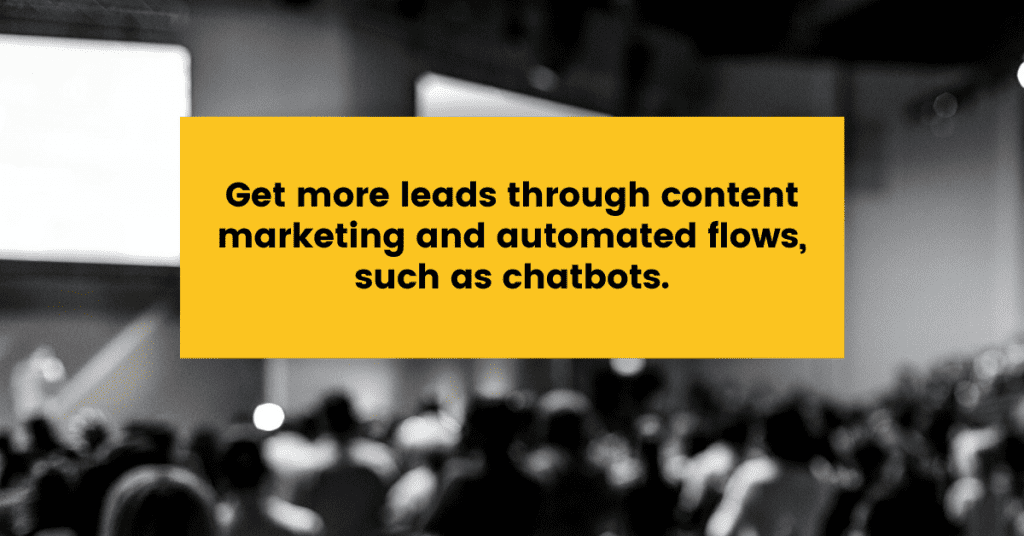
Here are a few use cases for B2B chatbots.
Events for lead nurturing – replace with ABM & social listening
64% of B2B marketers surveyed for the 2019 Demand Gen Report said they used to events to convert and accelerate leads at middle and late stages of the funnel. Events are great to meet your current leads (and even customers, but more on this later) and can help take them across the line from lead to customer or help them progress through the funnel.
One of the reasons events facilitate lead nurturing is because they build trust by establishing a personal connection with someone from your team and it gives you the chance to have a meaningful dialogue, based on your prospect’s needs. You can still achieve this through ABM and social listening. ABM helps you understand what is relevant for your leads, by painting a picture of how they engage with your content and website and social listening tools give you a way to start the conversation and engage in a meaningful way, using the know-how you have built through ABM.
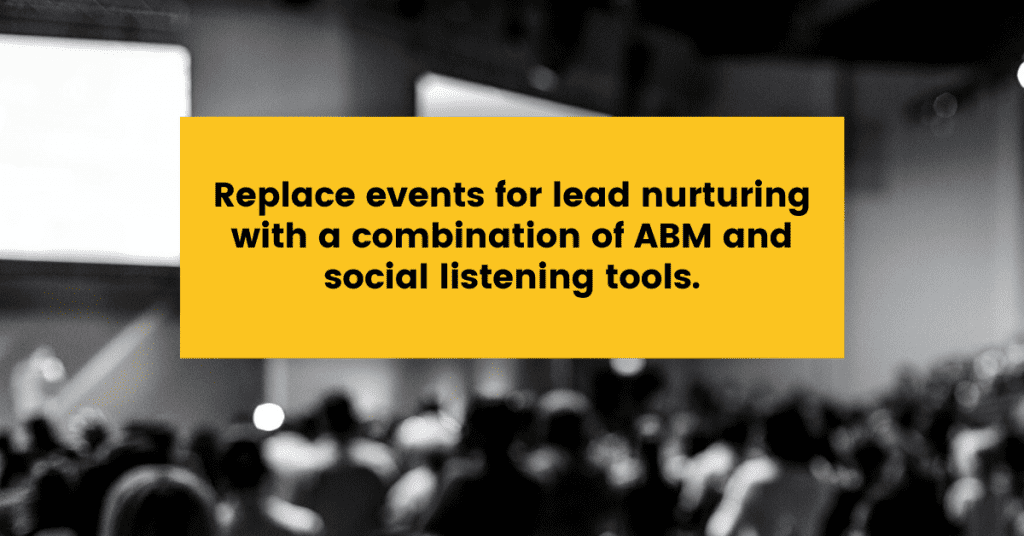
One of our education clients developed events for their business audience to increase fundraising and are now transitioning to tailored communication based on CRM interactions and the areas of interest they have identified for each main account.
Here is a guide from Sprout Social on using social listening for sales.
Events for closing contracts – replace with direct conversation
Events can also help you deliver the decisive argument, that will convert leads to customers. Since most B2B leads go through an entire process before converting, events can be considered a final step, which can be replaced by a direct conversation, as you would do at your booth or in the conference room.
Lead scoring can help you identify the leads that are most likely to convert and you can target them with a tailored message, based on your previous interactions. Again, check if the timing is right for new investment. In order to build the relationship and have some low hanging fruit after the crisis, you can offer a free trial or test run of your services, which can help your prospects decide if it’s right for them.
Be mindful that most of the people working in B2B are spending time on calls nowadays, so don’t take up too much of their time. Another client of us has replaced marketing automation with direct calls to prospects, where they get a chance to better understand the issues they are facing and come up with new ways of helping. We are currently working on launching a new digital product that can address the needs we have discovered during these calls.
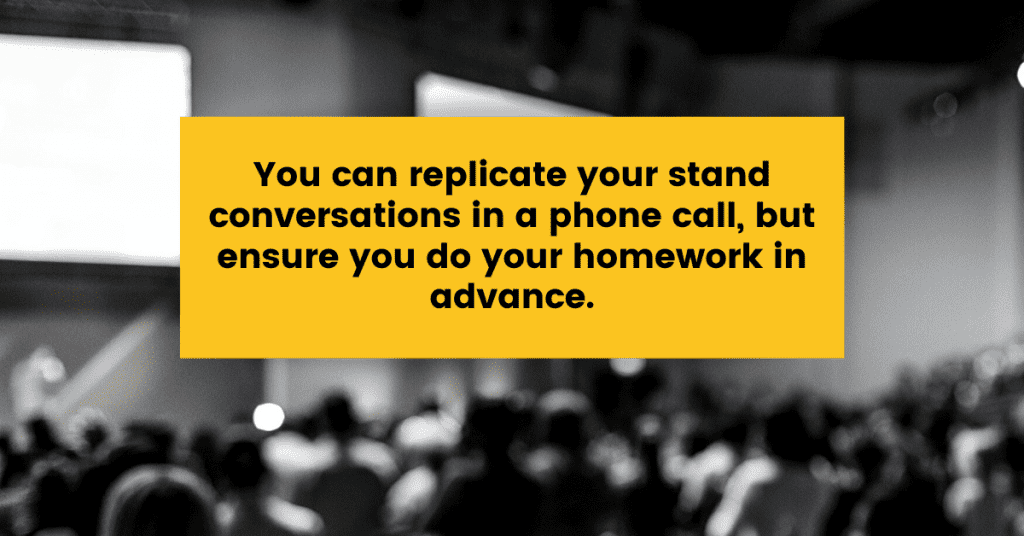
Here is a guide to making the best follow up calls.
Events for customer engagement – replace with new tech
Lastly, you may be using events to engage with your current customers, like big tech companies have started doing before turning their events into big meetings for everyone: Adobe Summit, Oracle OpenWorld, Facebook F8 and others.
While most companies mainly focus on lead generation and closing, you should not drop the ball on customer engagement. Keeping your customer happy makes them willing to pay more (customers are open to pay a premium of up to 13% by receiving a great customer experience), according to PwC. Plus, Adobe mentions that companies with customer engagement strategies see a 25% increase in close rates. No need to sell it further, customer engagement is important for many reasons.
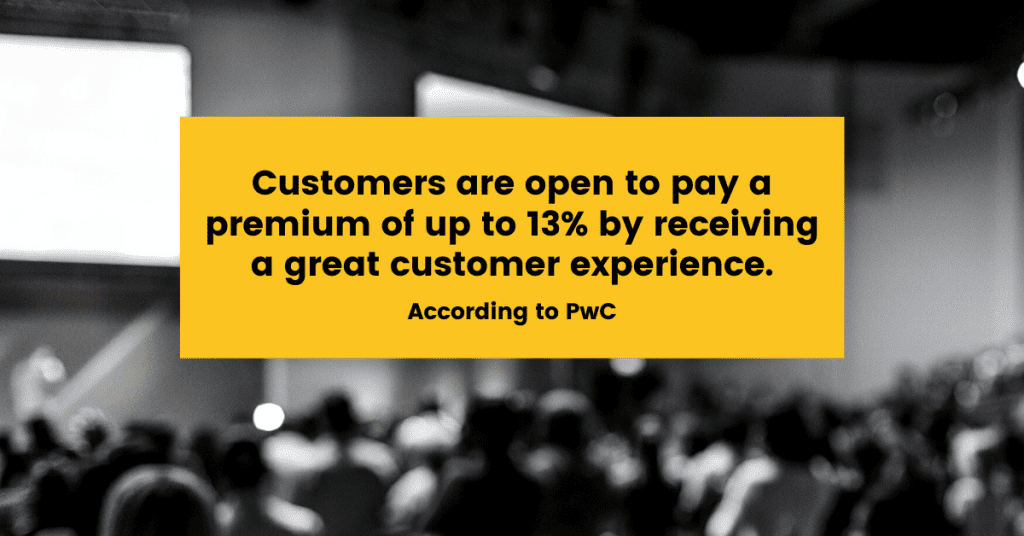
Your capabilities may have changed recently and you may have had to let some of your team go, so you may need to transition from a human based interaction to a technology based one. Before you decide on what technology to use, review the costs and how it integrates with the systems you already have in use. Here is a review of how technology is believed to change customer engagement.
Whilst I’d wish to tell you that events will be back soon, it may be 2020 will be completely different to what we planned, so it is possible that Plan B will become Plan A for the next period. However, when we will bounce back, we will come back stronger – just imagine how many people are eager to network now!
And if you need help in adapting your marketing strategy to an eventless world, you can book a free consultation service with us.
Sign up for the newsletter. Decent content, no spam, ever.
About the author:

I am Raluca Apostol, Founder and Account Director at Event Marketing Stars and I have helped generate over 30,000 leads for clients in B2B and B2C, on 3 continents.
I am passionate about events, lead generation and monetisation. If you want to reach out, you can find me on LinkedIn here.


